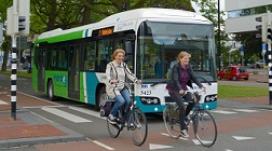SBIR Selects 3 Awardees to Receive Research Funding
The U.S. Department of Transportation’s (U.S. DOT) Small Business Innovation Research (SBIR) program recently named three awardees that will receive funding to move forward with their research.
Each year, the SBIR program taps into the power of small businesses to develop cutting-edge solutions to some of U.S. DOT’s most pressing challenges.
“SBIR is a great opportunity for small businesses to grow and fund work targeting research areas that are important to the U.S. DOT and the nation’s transportation system,” said Rachael Sack, DOT’s SBIR program director at Volpe. “This year’s awardees demonstrate the creative, innovative thinking that serves as the foundation for SBIR: to transform an idea into something they can develop and deploy.”
SBIR received 68 submissions in response to U.S. DOT’s 2016 Phase I solicitation. Three businesses were selected to receive a total of $450,000 for the following topics:
Technological Enhancements to Improve and Expand Casual Carpooling Systems
Awardee: Applied Engineering Management Corporation
Casual carpooling may be an important strategy to help reverse the downward trend of traditional carpooling’s decline in the United States, which has remained at a low level since 2004. Casual carpooling enables participants to ride with different people for each trip with no ongoing commitment and make rideshare arrangements instantaneously.
The Federal Highway Administration (FHWA) sought creative approaches to improving and expanding casual carpooling systems, addressing related challenges, and instilling a culture where drivers check for incentives daily to slightly modify their trips in ways that improve the system.
Connected Bicycle: Communicating with Vehicles and Infrastructure
Awardee: Charles River Analytics
Dedicated short-range communications (DSRC), one of the emerging technologies for vehicle-to-infrastructure (V2I) and vehicle-to-vehicle (V2V) communication, can provide safety information and cooperate with DSRC-equipped traffic signals to provide improved bicycle detection, as well as convey information to bicyclists about signal phase changes.
FHWA sought to explore the use of bicycle sensor technologies in order to collect data from bicycles to share via DSRC and develop an application that can be downloaded to various types of generally used smart phones, which can interface with the device.
Pedestrian and Cyclist Detection Devices for Transit Buses
Awardee: Novateur Research Solutions LLC
In recent years, sensors have been developed to detect the presence of pedestrians and bicycles in the path of a transit vehicle.
The Federal Transit Administration (FTA) sought for the design and development of innovative, economically viable, accurate, and durable technologies or devices that use sensor technologies in the detection of bicycles and pedestrians, leveraging innovations and developments that have occurred in commercial/passenger vehicle applications to significantly improve the safety of pedestrians and bicyclists in a transit environment.
Read more about each topic in the archived 16.1 solicitation and learn how to participate in SBIR.
About SBIR

Volpe administers the Small Business Innovation Research (SBIR) program for U.S. DOT and helps U.S. DOT’s operating administrations identify topics and solutions to some of our nation’s most pressing transportation challenges.
Through SBIR, Volpe has awarded more than $78 million in small business funding over the last 10 years on behalf of DOT’s eight participating operating administrations.
